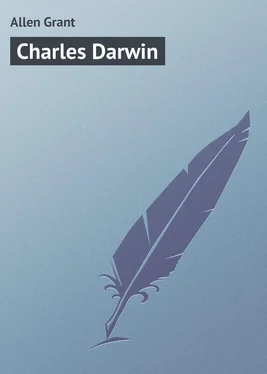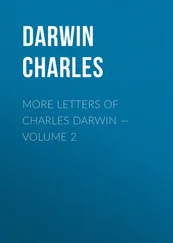Grant Allen - Charles Darwin
Здесь есть возможность читать онлайн «Grant Allen - Charles Darwin» — ознакомительный отрывок электронной книги совершенно бесплатно, а после прочтения отрывка купить полную версию. В некоторых случаях можно слушать аудио, скачать через торрент в формате fb2 и присутствует краткое содержание. Жанр: foreign_prose, на английском языке. Описание произведения, (предисловие) а так же отзывы посетителей доступны на портале библиотеки ЛибКат.
- Название:Charles Darwin
- Автор:
- Жанр:
- Год:неизвестен
- ISBN:нет данных
- Рейтинг книги:4 / 5. Голосов: 1
-
Избранное:Добавить в избранное
- Отзывы:
-
Ваша оценка:
- 80
- 1
- 2
- 3
- 4
- 5
Charles Darwin: краткое содержание, описание и аннотация
Предлагаем к чтению аннотацию, описание, краткое содержание или предисловие (зависит от того, что написал сам автор книги «Charles Darwin»). Если вы не нашли необходимую информацию о книге — напишите в комментариях, мы постараемся отыскать её.
Charles Darwin — читать онлайн ознакомительный отрывок
Ниже представлен текст книги, разбитый по страницам. Система сохранения места последней прочитанной страницы, позволяет с удобством читать онлайн бесплатно книгу «Charles Darwin», без необходимости каждый раз заново искать на чём Вы остановились. Поставьте закладку, и сможете в любой момент перейти на страницу, на которой закончили чтение.
Интервал:
Закладка:
Yet another factor in the intellectual stir and bustle of the time must needs be mentioned even in so short and cursory a sketch as this of the causes which led to the Darwinian crisis. In 1798, Thomas Malthus, a clergyman of the Church of England, published the first edition of his famous and much-debated 'Essay on the Principle of Population.' Malthus was the first person who ever called public attention to the tendency of population to increase up to the utmost limit of subsistence, as well as to the necessary influence of starvation in checking its further development beyond that point. Though his essay dealt only with the question of reproduction in human societies, it was clear that it possessed innumerable analogies in every domain of animal and vegetable life. The book ran through many successive editions with extraordinary rapidity for a work of its class, it was fiercely attacked and bravely defended, it caused an immense amount of discussion and debate, and besides its marvellous direct influence as a germinal power upon the whole subsequent course of politico-economical and sociological thought, it produced also a remarkable indirect influence on the side current of biological and speculative opinion. In particular, as we shall more fully see hereafter, it had an immediate effect in suggesting to the mind of the great naturalist who forms our present subject the embryo idea of 'natural selection.'
Such then was the intellectual and social world into which, early in the present century, Charles Darwin found himself born. Everywhere around him in his childhood and youth these great but formless evolutionary ideas were brewing and fermenting. The scientific society of his elders and of the contemporaries among whom he grew up was permeated with the leaven of Laplace and of Lamarck, of Hutton and of Herschel. Inquiry was especially everywhere rife as to the origin and nature of specific distinctions among plants and animals. Those who believed in the doctrine of Buffon and of the 'Zoonomia' and those who disbelieved in it, alike, were profoundly interested and agitated in soul by the far-reaching implications of that fundamental problem. On every side evolutionism, in its crude form, was already in the air. Long before Charles Darwin himself published his conclusive 'Origin of Species,' every thinking mind in the world of science, elder and younger, was deeply engaged upon the self-same problem. Lyell and Horner in alternate fits were doubting and debating. Herbert Spencer had already frankly accepted the new idea with the profound conviction of a priori reasoning. Agassiz was hesitating and raising difficulties. Treviranus was ardently proclaiming his unflinching adhesion. Oken was spinning in metaphysical Germany his fanciful parodies of the Lamarckian hypothesis. Among the depths of Brazilian forests Bates was reading the story of evolution on the gauze-like wings of tropical butterflies. Under the scanty shade of Malayan palm-trees Wallace was independently spelling out in rude outline the very theory of survival of the fittest, which Charles Darwin himself was simultaneously perfecting and polishing among the memoirs and pamphlets of his English study. Wollaston in Madeira was pointing out the strange adaptations of the curious local snails and beetles. Von Buch in the Canaries was coming to the conclusion that varieties may be slowly changed into permanent species. Lecoq and Von Baer were gradually arriving, one by the botanical route, the other by the embryological, at the same opinion. Before Charles Darwin was twenty, Dean Herbert had declared from the profound depth of his horticultural knowledge that kinds were only mere fixed sports; and Patrick Matthew, in the appendix to a work on 'Naval Timber,' had casually developed, without perceiving its importance, the actual distinctive Darwinian doctrine of natural selection. Robert Chambers published in 1844 his 'Vestiges of Creation,' in which Lamarck's theory was impressed and popularised under a somewhat spoilt and mistaken form: it was not till 1859 that the first edition of the 'Origin of Species' burst like a thunderbolt upon the astonished world of unprepared and unscientific thinkers.
This general attitude of interest and inquiry is of deep importance to the proper comprehension of Charles Darwin's life and work, and that for two distinct reasons. In the first place, the universal stir and deep prying into evolutionary questions which everywhere existed among scientific men in his early days was naturally communicated to a lad born of a scientific family, and inheriting directly in blood and bone the biological tastes and tendencies of Erasmus Darwin. In the second place, the existence of such a deep and wide-spread curiosity as to ultimate origins, and the common prevalence of profound uniformitarian and evolutionary views among philosophers and thinkers, made the acceptance of Charles Darwin's particular theory, when it at last arrived, a comparatively easy and certain matter, because by it the course of organic development was assimilated, on credible grounds, to the course of all other development in general, as then already widely recognised. The first consideration helps us to account in part for the man himself; the second consideration helps us even more to account for the great work which he was enabled in the end so successfully to accomplish.
CHAPTER II
CHARLES DARWIN AND HIS ANTECEDENTS
From the environment let us turn to the individual; from the world in which the man moved to the man who moved in it, and was in time destined to move it.
Who was he, and whence did he derive his exceptional energy and intellectual panoply?
Erasmus Darwin, the grandfather, the first of the line in whom the distinctive Darwinian strain of intellect overtly displayed itself, was the son of one Robert Darwin, a gentleman of Nottinghamshire, 'a person of curiosity,' with 'a taste for literature and science;' so that for four generations at least, in the paternal line, the peculiar talents of the Darwin family had been highly cultivated in either direction. Robert Darwin was an early member of the Spalding Club, a friend of Stukeley the antiquary, and an embryo geologist, after the fantastic, half-superstitious fashion of his own time. Of his four sons, both Robert, the eldest, and Erasmus, the youngest, were authors and botanists. Erasmus himself was a Cambridge man, and his natural bent of mind and energy led him irresistibly on to the study of medicine. Taking his medical degree at his own university, and afterwards preparing for practice by attending Hunter's lectures in London, besides going through the regular medical course at Edinburgh, the young doctor finally settled down as a physician at Nottingham, whence shortly afterward he removed to Lichfield, then the centre of a famous literary coterie. So large a part of Charles Darwin's remarkable idiosyncrasy was derived by heredity from his paternal grandfather, that it may be worth while to dwell a little here in passing on the character and career of this brilliant precursor of the great evolutionist. Both in the physical and in the spiritual sense, Erasmus Darwin was one among the truest and most genuine ancestors of his grandson Charles.
A powerful, robust, athletic man, in florid health and of temperate habits, yet with the full-blooded tendency of the eighteenth century vividly displayed in his ample face and broad features, Erasmus Darwin bubbled over with irrepressible vivacity, the outward and visible sign of that overflowing energy which forms everywhere one of the most marked determining conditions of high genius. Strong in body and strong in mind, a teetotaler before teetotalism, an abolitionist before the anti-slavery movement, he had a great contempt for weaknesses and prejudices of every sort, and he rose far superior to the age in which he lived in breadth of view and freedom from preconceptions. The eighteenth century considered him, in its cautious, cut-and-dried fashion, a man of singular talent but of remarkably eccentric and unsafe opinions. Unfortunately for his lasting fame, Dr. Darwin was much given to writing poetry; and this poetry, though as ingenious as everything else he did, had a certain false gallop of verse about it which has doomed it to become since Canning's parody a sort of warning beacon against the worst faults of the post-Augustan decadence in the ten-syllabled metre. Nobody now reads the 'Botanic Garden' except either to laugh at its exquisite extravagances, or to wonder at the queer tinsel glitter of its occasional clever rhetorical rhapsodies.
Читать дальшеИнтервал:
Закладка:
Похожие книги на «Charles Darwin»
Представляем Вашему вниманию похожие книги на «Charles Darwin» списком для выбора. Мы отобрали схожую по названию и смыслу литературу в надежде предоставить читателям больше вариантов отыскать новые, интересные, ещё непрочитанные произведения.
Обсуждение, отзывы о книге «Charles Darwin» и просто собственные мнения читателей. Оставьте ваши комментарии, напишите, что Вы думаете о произведении, его смысле или главных героях. Укажите что конкретно понравилось, а что нет, и почему Вы так считаете.












